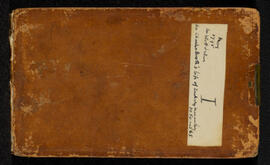Tavistock House. - Houghton's reference to the Guild [of Literature and Art. in a speech to the Royal Literary Fund]; acknowledges shortcomings, but Act of Incorporation prevents appropriation of funds for first seven years; responsible management in the interim.
Embossed notepaper for St. Dunstans, Regents Park. - Coxe showed him letters of Francisque Michel referring to an MS of St. Brandan's [sic] voyage]; perhaps it will be suitable for the Philobiblon as the Roxburghe Club does not propose to print it. Encloses correspondence [no longer present]. Asks Houghton what he thinks of the Mystère de Saint Louis [published for the Roxburghe Club in 1871]; curious Anglo-French phrases.
General Post Office. - Encloses paper; hopes Houghton will wish to join the Society.
Enclosed: Prospectus of Wyclif Society, containing lists of officers and members; also details of ‘Other Societies (Which all want Fresh Members)’.
72 Great Russell St. - Invites Milnes to act as steward at Literary Fund anniversary on 12 May.
Penshuret (on embossed notepaper, 77 Gloucester Place, Hyde Park, W.) - Recommends J. H. Woodward for Secretaryship of Newspaper Press scrubs: he was a Bristol clergyman but has been out of work since converting to Roman Catholicism fifteen years ago.
The Cottage, Harley St., Bow Road, London. - Campbell’s aunt Mary was governess to the Misses Milnes; poor health forced him to leave Scotland for Malta, afterwards he travelled in the Near East and Europe; fears a relapse if he resumes further occupation; Government must show appreciation of his late uncle [Thomas Campbell]’s poetic contribution by supporting a relative; seeks Richard Monckton Milnes’ help in obtaining Landing Waitership in the Port of London.
Includes draft letter in French.
Calculations under headings: 'Bills 1840'; 'Given'; 'Living'; 'M.P.'; 'Lost'; 'Clubs'; 'Travelling'; 'Books'; 'Lodging'.
Shoemarket, Pontefract. - Writes to intercede on the behalf of George Scott of Brotherton, whose aged mother was a close friend of Crosby's late wife and whose wife is 'far advanced in pregnancy', who has had a warrant issued against him on the grounds of poaching on Milnes' father's estate about three months ago 'in consequence of which, he is now a friendless and a houseless wanderer'. Gives intemperance and Scott's sincere regret as mitigating circumstances. Asks Milnes to speak to his father on Scott's behalf to stay the prosecution.
1 letter, 1 Jul. [1851], Henrietta Crewe to Richard Monckton Milnes; 2 letters, 30 Jun. [1851] and 12 Nov [1851] from Milnes to Henrietta Crewe.
Records Milnes' parents, his birth in the parish of St. George's, Westminster on 19 Jun. 1809 and his baptism at Fryston on 8 Aug. 1809 by the Rev. Samuel Lucas. 22 Aug. 1809 is presumably the date of entry of this information into the register at Wakefield, it is signed by Thomas Johnstone, Minister.
Becca [Hall, near Aberford].
Journal created for Niels Bohr's 50th birthday. It contains an article by Frisch and G. Placzek, 'Zur Frage der Messbarkeit des Landau'schen Schönheitskoeffizienten'.
Re children of the poet Robert Bloomfield.
The system is described as 'patronized by upwards of twenty thousand persons of distinction !!!'. Stuart announces his arrival in Hatfield and his intention to give instruction in his system for a short period. A course of 'Six short and easy lessons', for the price of one guinea', is said to teach 'the most perfect freedom of Hand, and correct uniformity of Style'. Those who cannot write at all will be taught 'a beautiful Hand in Twelve Lessons for Two Guineas', while '[]n-Making in One Lesson' costs five shillings. Stuart will only be a short time in Hatfield due to his 'Engagements in Doncaster', so 'early application' is recommended.
'Numerous Specimens' may be seen on application to Stuart, in person or 'by Letter (post-paid)' [see HC/2/2-3].
Printed by 'Whaley, printer, bookbinder and, stationer, Thorne'.
